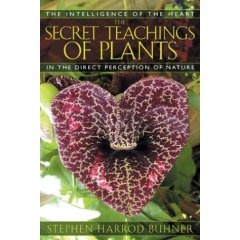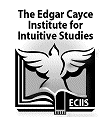| Edited by HENRY REED, Ph.D. |
May 25, 20088
|

|
The Secret Teachings of Plants The Intelligence of the Heart in the Direct Perception of Nature By Stephen Harrod Buhne Book Summary by Naomi Mullen This book (published by Bear & Co.) not only gives guidance on receiving plant communication, it also goes into intuitive information that can be derived from humans, animals, objects, and places. In addition it gives the linear mind knowledge that has been determined scientifically about physics and physiology that ties the information together. So this book is a "How to" of intuitive heart connection that also provides poetic and scientific support to give balance in the training of the Heart and Mind. The ancient mode of cognition called biognosis means "knowledge from life". It has not disappearred from use even though the scientific method has dominated Western culture. It is inherent in our bodies and can be developed further. We actually use it unconsciously to some extent without realizing it. The current world view of mechanomorphism (seeing the world as a machine) is threatening human and other species survival. Biognosis is a way of balancing this unsustainable way of thinking and living on the Earth. By using the biognosis method of knowing we can apprehend wholeness instead of reductionist and separatist ways of thinking. We can use our heart as an organ of perception to gain knowledge from nature because it is not linear and our feelings can connect us to the holistic manifestation of creation. Scientists have studied the effects of mechanical, chemical, hormonal, electromagnetic and other influences on bodies. What they have not taken into account is that the meaning of the stimulation received is the most important factor. The perturbation that affects a self-organized system is mainly based on the meaning to the individual. There is constant balance between chaos and order in a system. There has to be dark for there to be the contrast of light. The meaning is the most significant point. Instabilities create a new state of balance which is what causes biological innovation. Therefore the change creates novelty in an organism. The more interacting elements there are the more an organism's equilibrium is affected. Regular, periodic stimuli are adapted to and not noticed over time. Living systems are able to notice perturbations that are very weak regardless if they are chemical, mechanical or electromagnetic. They are able to detect perturbations so tiny that scientists say they cannot be detected. An example is the parts per trillion of plant chemical in the environment. Living organisms receive electromagnetic signal information continuously. Signals convey directions for cells to direct waste, healing, the heart beat, as well as for birds to follow magnetic lines for migration, bees to find pollen and between members of a family. Life on Earth has used the electomagnetic spectrum to send and receive signals for almost 4 billion years. Living systems are reading broadband frequencies not just narrowband like a radio receiver. Electromagnetism covers most energy known today. It includes power waves like atomic-molecular action, radio waves; microwaves, infrared, ultraviolet, and visible light waves to x-rays to gamma rays. Living organisms are able to amplify these meaningful electromagnetic waves and decode them. Transmission and reception of electromagnetic information is an ability that all living systems have, communicating in both directions. Cells are able to pick up information in the form of pressure, magnetic, chemical, and temperature changes. Enzymes and molecules also respond to the same. The skin has an inner and outer electrical field so that when there is an injury it creates a short-circuit that directs new skin cells to the area needing it. Other parts of the body are able to heal due to this electrical feedback of information. The heart is a large group of self-organizing cells. Cells are able to synchronize or entrain with each other. Heart cells have gap junctions in them that provide a direct ionic path from cell to cell. Because of the organization of the heart cells they are able to detect very weak electric fields. Fish have the ability to detect electrical signals so well that they can travel in schools and detect the energy of other organisms. Organisms need to be able to detect perturbations at the lowest level possible to survive. All living organisms are able to "fine tune" their reception of electromagnetic signals from the background noise of the broadband of information present. The organism is able to increase a weak signal to ten thousand times it's strength in order to perceive it. The magnetic field of the Earth is 1/1000 th the strength of a toy magnet. Yet birds, bees and fish are able to navigate by the Earth's field. The magnetite that helps direct animals is made inside of the body. Humans also have magnetite in their bodies which is located in the hippocampus. This makes them very sensitive to magnetic field fluctuations. The hippocampus is actually more responsive to extremely low magnetic frequencies in the range of the Earth's magnetic field than it is to high intensity fields. All of the body's sensory systems flow to the hippocampus. This is sending a large amount of information. The hippocampus is able to interpret the meaning and transfer it to the neocortex that holds memories. The stronger the emotion the more strongly the information is encoded. In a real or enriched environment humans are able to form more neurons as opposed to a simple environment such as television or mathematical learning. We are made to be immersed in the wild for our hippocampus and Central Nervous System to be healthy. When it is said that there is an energy in a place it is acurate because humans are superb at detecting energies from the electric and magnetic sources in their environment. The human heart is one of the most powerful electromagnetic generators and receivers known to humans. This makes it a highly evolved organ that perceives and communicates energies. The heart not only is a pump, it is an electromagnetic generator, an endrocrine gland, and part of the central nervous system. It is able to generate, hormonal, neurohormonal, electric, magnetic, and chemical messages, also temperature and pressure information. Research has shown that the hormone HPVD (heart produced vessel dilator) is able to strongly inhibit pancreatic cancer cells. The heart produces 4 other known hormones that effect the blood vessels, heart function, vision, and the brain to name a few things. The heart has it's own memory. It has been documented that heart transplant recipients have taken on behaviors common to the original donor. They were not behaviors that the recipient previously had.The heart has neurons similar to the brain and is affected most by strong emotions that are imprinted as memory. Information has been found by analysis to impact the heart before the brain. We experience the world first through the heart which then sends the information to the brain. The heart and brain have a dialog about how to respond to situations before action is taken. Individual heart cells entrain with each other and separate hearts also tend to synchronize in close proximity. The energy system of the heart is open and interacts with other systems. It is constantly using, storing, and emitting energy. An infant can help to be calmed by a slower beating heart. Rapid beating in a horror movie can stimulate panic in the audience. There are locations in the body that act as biological oscillators. The three strongest are the heart, GI tract and brain. When attention is shifted to notice outside stimuli it causes the heart to slow down or go into bradycardia. The eyes dilate and the focus softens and peripheral vision increases. Mental activity increases heart rate and pupil constriction. The heartbeat influences the autonomic nervous system, cognitive functions, and the emotions. As a way of increasing coherence participants have been asked to shift into emotions of caring and affection. This can create a repatterning of the heart's electromagnetic field. Every emotion temporarily restructures the heart's field. When one of the body's oscillators becomes the focus the other ones entrain and boost the power of the effect. Coherence of the heart causes cortisol production to drop which improves immune, memory, hippocampal response, and glucose utilization. DHEA production increases by 100%. DHEA is essential in body tissue repair, insulin use, well-being and sexual hormone production. A cascade of other positive effects occur in other organs and functions of the body as well. Improved intuitive awareness and decision making are also reported as a benefit by heart focus practitioners. Blood pressure has been shown to be reduced without medication in six months by using heart coherence training. Anxiety, stress and depression have also been shown to be reduced. Feelings of caring, love, and appreciation further enhance the benefits of the training on the physiology. Human and other living organisms energy fields connect from a distance, and it has been measurable from up to 5 feet away. The strongest energy exchange is from touch to 18 inches away. Electromagnetic signals continue outward indefinitely but cannot be measured by instrumentation at this time. A coherent heart is able to influence other nearby persons positively. A person with a caring coherent heart field causes other living beings to respond toward being more responsive, open, affectionate, animated, and closely connected. Plants have nervous systems that are almost as sophisticated as our own. These nervous systems are highly sensitive to electromagnetic fields. All organisms can detect and respond to broadband signals. Meaning is embedded in these electromagnetic fields and are experienced as emotions that affect the heart rate, hormones, pressure waves and neurochemical activity. Emotions are directed out as communication and taken in as perception. This creates a dynamic dialog that occurs between the human and the world. Our heart needs to be flexible to detect this information in our environment. Like many skills it takes years to become adept at perceiving with the heart. During our long school years we are trained out of using our hearts. The intelligence and information is out there it just isn't noticed. Heart-centered cognition can move us from the dead, rational, mechanical universe toward experiencing the living soulfullness of the world. There is a period of time when the scar tissue begins to be stripped away from our heart so that it can become flexible again. Using the heart as an organ of peception allows us to feel our connection to the web of the Earth and live a whole and fulfilled life. To develop the ability to communicate with plants and open your heart, go to the wilderness. Find a place uncivilized. Breathe deeply and become aware in your body. Begin walking. Shift awareness to the Earth under your feet. Notice the sounds arround you. Use your senses instead of thinking. Pay attention to the colors around you. When a plant is more interesting to you concentrate on it. Look at it's leaves, shape, stems, and colors. Touch a leaf and feel it. Smell it with a long deep breath. Immerse yourself in the smell. Find out what the smell is communicating. Next hold a leaf in your mouth. Explore the texture of it then let it go. Take a small piece of leaf in your mouth and taste it. What is the flavor? There aren't very many poisonous plants. Learn those first if you are afraid. Humans have eaten daily from the wild for a millions of years. Become aware of feelings in you as you sit near the plant. Everything in the wild gives off communication. Describe to yourself what feelings arise and put them into words. Give reality to the information that comes through about the plant. When you leave the linear mind behind you are thinking with your heart. Be vulnerable and open to the plant. Write it down in a journal. What are the primary feelings? Notice everything in your body now. Write down the intimation, impression, mood, feeling of the plant. Allow the beauty of the plant to affect you. Notice how you care for it. The plant will take in the feelings you generate toward it and respond to you. You can sense the plant moving toward you, responding, and entraining with you. By paying attention you will know when you have reached rapport with the plant. While in this state ask the plant how you can use it as medicine. Tell it of your need. It will respond. The answer may come through your body, feelings, a phrase, pictures or thoughts that come to mind. You may have to interpret the meaning of the symbols that come to mind. It will take practice with many plants for this to become automatic. Scientists never ask the plant directly. Native Americans say you must talk to the plants like people and they most certainly will do what you ask. Giving respect to the plants is essential. An experience of life-to-life bonds you with the web of life. Ecstacy can be experienced in the process. Pythagoras stated that all things are intelligent. The Sufi teacher Hazrat Inayat Khan said that everything is speaking even though apparently silent. The feelings that come from the plant are the medicine. It is coded into this particular form. The one true thing is the feeling from the experience of the plant. Plants are like people you will love some and not prefer others. When gathering direct knowledge from the plants or other beings the first step is noticing sensory impressions. The second is noting what feelings these sensory impressions create. The third is determining what the meaning of the feelings that come up are. You can gather heart knowledge of humans as well. First observe the person with the sight. What is the appearance of their skin, clothing, mannerisms? Listen to their speech. What is it communicating? As you listen you may have thoughts pop up or feelings in your body. If a part of the body draws your attention then focus on that area. Pay attention to the feelings that arise while sitting with the person. You can converse while observing these feelings about the person. Allow yourself to care about the part of the person that you have been focusing on. Silently communicate with this part of the body. Send out a heart-touch to the body part. Keep exchanging information with the part of the body that needs healing. Create a rappport with the person and their body. Ask what is truly wrong in order to get more knowledge. This intimacy is important to get a healing relationship with the person. There will be a flash of information that gives details about the problem and receive it's pain. Ask the organ or system what it needs. Then send out a request to the plant or plants that can help. There are exercises in the Appendix of the book to learn to better read human made places, people, the natural world, the child, the infant, the body, the organ systems, going deeper into the human world, going deeper into people, and going deeper into nature. |




